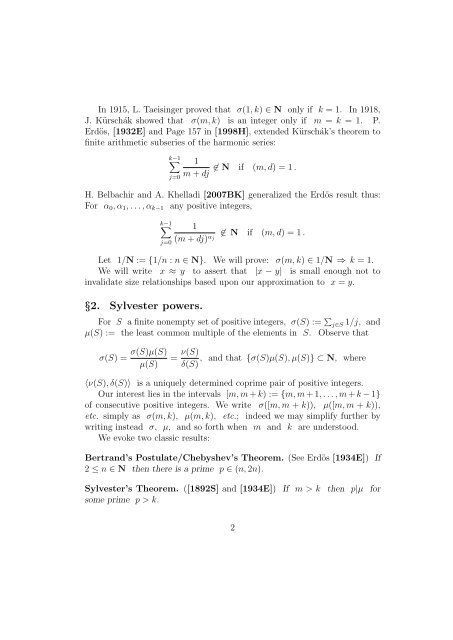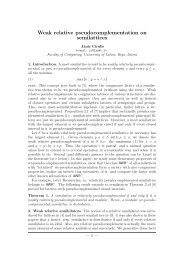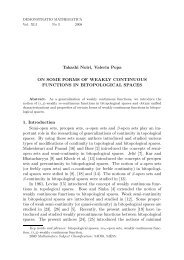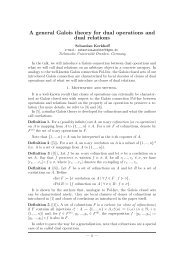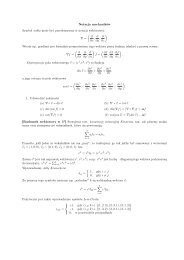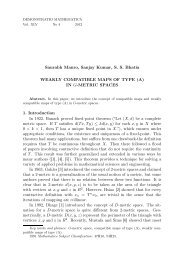Finite segments of the harmonic series
Finite segments of the harmonic series
Finite segments of the harmonic series
Create successful ePaper yourself
Turn your PDF publications into a flip-book with our unique Google optimized e-Paper software.
In 1915, L. Taeisinger proved that σ(1, k) ∈ N only if k = 1. In 1918,<br />
J. Kürschák showed that σ(m, k) is an integer only if m = k = 1. P.<br />
Erdös, [1932E] and Page 157 in [1998H], extended Kürschák’s <strong>the</strong>orem to<br />
finite arithmetic sub<strong>series</strong> <strong>of</strong> <strong>the</strong> <strong>harmonic</strong> <strong>series</strong>:<br />
k−1 1<br />
j=0 m + dj<br />
∈ N if (m, d) = 1 .<br />
H. Belbachir and A. Khelladi [2007BK] generalized <strong>the</strong> Erdös result thus:<br />
For α0, α1, . . . , αk−1 any positive integers,<br />
k−1<br />
<br />
j=0<br />
1<br />
(m + dj) αj<br />
∈ N if (m, d) = 1 .<br />
Let 1/N := {1/n : n ∈ N}. We will prove: σ(m, k) ∈ 1/N ⇒ k = 1.<br />
We will write x ≈ y to assert that |x − y| is small enough not to<br />
invalidate size relationships based upon our approximation to x = y.<br />
§2. Sylvester powers.<br />
For S a finite nonempty set <strong>of</strong> positive integers, σ(S) := <br />
j∈S 1/j, and<br />
µ(S) := <strong>the</strong> least common multiple <strong>of</strong> <strong>the</strong> elements in S. Observe that<br />
σ(S) = σ(S)µ(S)<br />
µ(S)<br />
ν(S)<br />
= , and that {σ(S)µ(S), µ(S)} ⊂ N, where<br />
δ(S)<br />
〈ν(S), δ(S)〉 is a uniquely determined coprime pair <strong>of</strong> positive integers.<br />
Our interest lies in <strong>the</strong> intervals [m, m + k) := {m, m + 1, . . . , m + k − 1}<br />
<strong>of</strong> consecutive positive integers. We write σ([m, m + k)), µ([m, m + k)),<br />
etc. simply as σ(m, k), µ(m, k), etc.; indeed we may simplify fur<strong>the</strong>r by<br />
writing instead σ, µ, and so forth when m and k are understood.<br />
We evoke two classic results:<br />
Bertrand’s Postulate/Chebyshev’s Theorem. (See Erdös [1934E]) If<br />
2 ≤ n ∈ N <strong>the</strong>n <strong>the</strong>re is a prime p ∈ (n, 2n).<br />
Sylvester’s Theorem. ([1892S] and [1934E]) If m > k <strong>the</strong>n p|µ for<br />
some prime p > k.<br />
2


